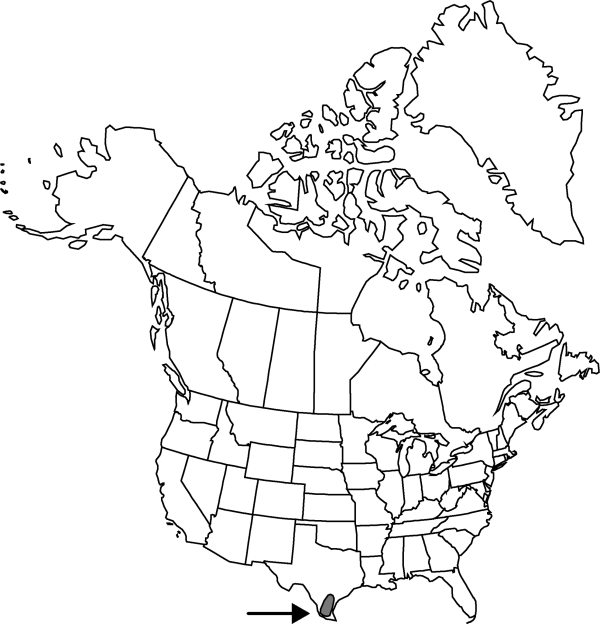Difference between revisions of "Abronia ameliae"
Wrightia 1: 54. 1945.
FNA>Volume Importer |
imported>Volume Importer |
||
| (7 intermediate revisions by 2 users not shown) | |||
| Line 8: | Line 8: | ||
}} | }} | ||
|common_names=Heart’s delight | |common_names=Heart’s delight | ||
| + | |special_status={{Treatment/ID/Special_status | ||
| + | |code=E | ||
| + | |label=Endemic | ||
| + | }} | ||
|basionyms= | |basionyms= | ||
|synonyms= | |synonyms= | ||
| Line 17: | Line 21: | ||
}}<!-- | }}<!-- | ||
| − | --><span class="statement" id="st- | + | --><span class="statement" id="st-undefined" data-properties=""><b>Plants </b>perennial. <b>Stems</b> procumbent to semierect, slightly to moderately branched, elongate, often reddish at nodes, viscid. <b>Leaves</b>: petiole 1–9 cm; blade deltate-ovate to elliptic, 2–8 × 2–6.5 cm, margins repand to sinuate, frequently undulate, adaxial surface glandular-puberulent, abaxial surface glandular-pubescent. <b>Inflorescences</b>: peduncle longer than subtending petiole; bracts ovate to elliptic, 5–16 × 2–10 mm, papery, glandular-pubescent; flowers 20–75. <b>Perianth</b>: tube magenta, 12–25 mm, limb bright magenta, 8–10 mm diam. <b>Fruits</b> narrowly turbinate, 6–9 × 3–4.5 mm, ± 2 times as long as wide, scarious, base attenuate, rounded or truncate at apex, with a broadly conic beak; wings 5, finely reticulate, thin walled, narrow, cavities extending throughout.</span><!-- |
-->{{Treatment/Body | -->{{Treatment/Body | ||
| + | |phenology=Flowering winter–spring. | ||
|habitat=Sandy soils, live-oak grasslands | |habitat=Sandy soils, live-oak grasslands | ||
|elevation=0-100 m | |elevation=0-100 m | ||
|distribution=Tex. | |distribution=Tex. | ||
| − | |discussion=<p>Abronia ameliae has limited cultivation as an ornamental in southern Texas.</p> | + | |discussion=<p><i>Abronia ameliae</i> has limited cultivation as an ornamental in southern Texas.</p> |
|tables= | |tables= | ||
|references= | |references= | ||
| Line 32: | Line 37: | ||
-->{{#Taxon: | -->{{#Taxon: | ||
name=Abronia ameliae | name=Abronia ameliae | ||
| − | |||
|authority=Lundell | |authority=Lundell | ||
|rank=species | |rank=species | ||
| Line 39: | Line 43: | ||
|basionyms= | |basionyms= | ||
|family=Nyctaginaceae | |family=Nyctaginaceae | ||
| + | |phenology=Flowering winter–spring. | ||
|habitat=Sandy soils, live-oak grasslands | |habitat=Sandy soils, live-oak grasslands | ||
|elevation=0-100 m | |elevation=0-100 m | ||
| Line 45: | Line 50: | ||
|publication title=Wrightia | |publication title=Wrightia | ||
|publication year=1945 | |publication year=1945 | ||
| − | |special status= | + | |special status=Endemic |
| − | |source xml=https:// | + | |source xml=https://bitbucket.org/aafc-mbb/fna-data-curation/src/2e0870ddd59836b60bcf96646a41e87ea5a5943a/coarse_grained_fna_xml/V4/V4_120.xml |
|genus=Abronia | |genus=Abronia | ||
|species=Abronia ameliae | |species=Abronia ameliae | ||
| − | |||
| − | |||
| − | |||
| − | |||
| − | |||
| − | |||
| − | |||
| − | |||
| − | |||
| − | |||
| − | |||
| − | |||
| − | |||
| − | |||
| − | |||
| − | |||
| − | |||
| − | |||
| − | |||
| − | |||
| − | |||
| − | |||
| − | |||
| − | |||
| − | |||
| − | |||
| − | |||
| − | |||
| − | |||
| − | |||
| − | |||
| − | |||
| − | |||
| − | |||
| − | |||
| − | |||
| − | |||
}}<!-- | }}<!-- | ||
-->[[Category:Treatment]][[Category:Abronia]] | -->[[Category:Treatment]][[Category:Abronia]] | ||
Latest revision as of 21:56, 5 November 2020
Plants perennial. Stems procumbent to semierect, slightly to moderately branched, elongate, often reddish at nodes, viscid. Leaves: petiole 1–9 cm; blade deltate-ovate to elliptic, 2–8 × 2–6.5 cm, margins repand to sinuate, frequently undulate, adaxial surface glandular-puberulent, abaxial surface glandular-pubescent. Inflorescences: peduncle longer than subtending petiole; bracts ovate to elliptic, 5–16 × 2–10 mm, papery, glandular-pubescent; flowers 20–75. Perianth: tube magenta, 12–25 mm, limb bright magenta, 8–10 mm diam. Fruits narrowly turbinate, 6–9 × 3–4.5 mm, ± 2 times as long as wide, scarious, base attenuate, rounded or truncate at apex, with a broadly conic beak; wings 5, finely reticulate, thin walled, narrow, cavities extending throughout.
Phenology: Flowering winter–spring.
Habitat: Sandy soils, live-oak grasslands
Elevation: 0-100 m
Discussion
Abronia ameliae has limited cultivation as an ornamental in southern Texas.
Selected References
None.
